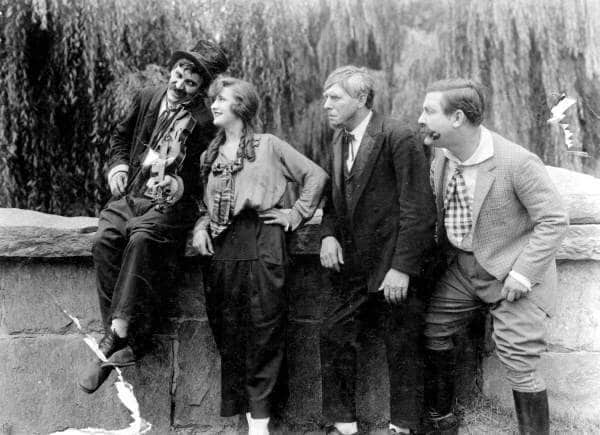How to Organise a Film Screening
There are many reasons to organise a film screening or community cinema event; from gaining exposure for the film and the filmmaker to creating a unique an immersive experience for film fans.
In this guide we’ll take a look at how to organise, promote and host your own film screening alongside some tips on how to make your film event unique.
Types of film screenings
Film screenings have always been an important part of a film’s production and release cycle. Traditionally they include:
• Test screenings
• Focus group screenings
• Critic screenings
• Sneak peak screenings or pre-release screenings
• Film premiers
However these days, film screenings are not limited to just new or blockbuster films. There are a number of reasons to host your own screening.
• Community cinemas
• Pop up cinema events
• Charity film screenings
• Student & degree film screenings
• Independent film festivals
• Private movie screenings
• Film contests
• Film societies & university film clubs
Why host a film screening?
Films are more than purely entertainment; they spark ideas, discussions and interest. Other than financial gains, below are just a handful of advantages to hosting your own film screening.
Passion To get exposure for a film that you love and believe others will love too. It’s for all those films that slip under the radar or never get the release schedule they deserve.
Community Starting a film club or community cinema is a fantastic way of getting people with a shared interest together and opens up a host of possibilities for adjoining events.
Awareness Film screenings can be a great way to raise awareness on issues and to get people involved in a wider social movement.
PR Create a buzz about your film, short or documentary by organising a film screening and inviting local press.
Fundraising Putting on events such as film screenings can be a great way of raising money for your campaign.
Support Independent filmmakers Artist and filmmaker James Static says, “We want to be part of a wider movement that offers an alternative, grassroots distribution channel to struggling film-makers. It’s difficult to get a small, personal film distributed when you’re competing against Avatar.”
Education Film can be a powerful and engaging educational tool, especially for children. It helps break down barriers and spark discussion and interest.
 Motion Picture Scene (1916) via Florida Memory on Flickr
Motion Picture Scene (1916) via Florida Memory on Flickr
Organising a film screening
Budget
One of the most common questions is how much does a film screening cost to put on? The honest answer: there is no average amount. In order to budget for your event, start by calculating equipment hire, venue hire, staffing expenses, catering, marketing and film screening licence.
Getting a film screening licence
Under UK copyright law, screenings films to audiences outside of the cinema or home for entertainment purposes requires a film screening licence from the copyright owner or their representatives.
On average, the cost to screen one film is between £70 and £140. However the type of licence you need depends on how you’ll use the films. For more information see the Independent Cinema Office (ICO) guidance.
You can get film licences from companies such as Filmbank. They can also be obtained directly from distributors such as the British Film Institute (BFI) or the copyright owner.
Location
Ensure that the location of your film screening is easily accessible for the majority of guests. Look for places with great transport links or nearby parking. Once you have an area in mind and know your budget, you can start to shortlist venues to visit.
Venue
To show the film to its best advantage, high quality projection and sound equipment is a must, but it isn’t everything. As well as considering the available facilities, technical equipment and flexibility of space, don’t forget to answer the more unusual questions:
• Can the venue be darkened sufficiently?
• Are the seats comfortable? Are they padded? If not, think about providing cushions.
• Can you change the temperature of the venue?
• Is the screen high enough to be seen clearly from any seat?
• Can you run through the screening in advance?
• Is there enough room and equipment for a discussion panel?
• Is there enough room for a live orchestra or band in the auditorium?
• Can you play music, serve food and drink, put up exhibition photographs etc. in a suitable adjoining space?
Think outside the box and choose a venue that will also create a buzz with your audience. It could be that the venue has some connection to the film being shown. Think A Bout de Souffle in a French cafe, Shawshank Redemption in a former prison, Dead Poets Society in a school classroom, Nosferatu in the crypt of a church or High Rise in a Brutalist building.
Making your cinema accessible for all
Community cinemas and private film screenings are not always an option for everyone. Stand out by making your film screen accessible to all and include the following:
• Subtitles or sign interpreters for hard of hearing audiences
• Ensure there are no flashing lights within the film
• Closer seating options available for partially sighted audiences
• Ensure the venue has wheelchair access
If your film screening is accessible, make sure that this is listed in your event promotion. Many people with hearing and sight difficulties will often check in advance to see if a venue has the facilities they need.
For more information and ideas on how to make your film event accessible, visit Cinema For All.
 Ramjet I-40 Engine via NASA on The Commons at Flickr
Ramjet I-40 Engine via NASA on The Commons at Flickr
Make your film screening memorable
With online film streaming and home cinema systems now so easily available, it’s more important than ever to create something your audience can’t experience at home. Think outside the box and go that step further to create an event that your audience won’t forget.
The BFI says, “To make your screenings extra-special and really cause a stir, include some extra elements to turn your screening into a larger event. It’s a great way to attract local – and even national – press coverage while attracting new audiences and generating a huge buzz in your area.”
Invite special guests
Special guests are a great way to pull in a crowd. Although having actors from the film is a huge bonus, it isn’t always possible. Remember anyone with a link to the film – be it behind the scenes, a writer or an academic – is a benefit to your screening. If the film is a documentary then consider having an expert attend. It’s a good idea to follow the screening with a talk by the filmmaker or a discussion panel.
Live music
If the film has a dramatic or well-known soundtrack, consider a film screening with a live orchestra or band to play before and after the screening.
Photography exhibitions
Documentary or student film screenings lend themselves well to adjoining photography exhibitions.
Go all out with a theme
Immerse your audience from the moment they step into your venue by following a theme. If you’re showing Grease, your entrance could be made to look like an American prom, your volunteers dressed in 1950s outfits and dancing in the vestibule.
How to introduce a film
Good film introductions can open your eyes to a new way of watching film and can breathe life into an old classic. Introducing your audience to the film they’re about to watch sets the scene and encourages them to enjoy themselves. Here are some top tips on how to deliver a great introduction:
Be enthusiastic: It’s difficult to get the audience excited about a film if you aren’t excited yourself.
Don’t overdo it: If you know a lot about the film it’s easy to go into too much depth. Keep your introduction short and treat it as a teaser for what’s about to follow.
Practice: Just because you aren’t the main attraction, it is not OK to wing it. Preparation is key. If nothing else, practicing your introduction will give you a chance to ditch those notes and immerse yourself in the experience.
Don’t give away spoilers: Seriously, there’s nothing worse.
Film screenings with Question and Answer sessions
Depending on the film you are screening, you may want to consider organising a speaker or panel of speakers to lead a discussion after the film. Producers, writers, filmmakers, actors and experts are ideal.
Top tips for moderating a successful discussion panel
• The moderator should have a strong interest or connection with the film
• Research your panellists
• Share the structure of the discussion before the event
• Have a list of discussion topics to kick-start a conversation
• Let panellists talk together
• Field questions from the audience
 Creature from The Black Lagoon via Florida Memory on Flickr
Creature from The Black Lagoon via Florida Memory on Flickr
How to promote a film screening
Before you promote your screening you need a hook to talk about. Think about what makes your screening event different to others. If you’re serving food other than the conventional popcorn, shout about it. If you’ve got a discussion after the screening, you guessed it, shout about it.
Remember this is the time to tell people why attending your film screening event is better than watching a film at home.
Before
Most people need a fair bit of notice before they can commit to an event so promoting at least three weeks in advance is a good rule of thumb.
In the run up to your event create a buzz about your screening by:
• Creating a hashtag for social media and use it on your posts
• Listing the event for free on Eventbrite
• Creating a Facebook event
• Building anticipation by leaking aspects of the event
• Targeting local papers
• Maintaining an active social media presence
During
Just because the lights have dimmed at the opening scene has started, it doesn’t mean that your job promoting the event is done. Throughout the event (but not the actual screening of course!) :
• Make sure you post photos, quotes and videos on social media throughout the event. For more information check out our how to guide on live tweeting at events.
Eventbrite suggest, “Instagram and Twitter can also be used to document the set-up of your event and behind the scenes action which can make your audience feel included and involved in the whole process.”
• If you are filming the event or taking photos you must put up a large sign that tells people it is being filmed. If you have guest speakers they must sign a release form in advance.
After
The credits may be rolling but it’s not over yet…
• Follow up with any press that showed interest in the event
• Publically thank your guest speakers
• Check your social media and reply and retweet where relevant. Engage with your audience – don’t let the conversation be one-sided.
• Use social channels to ask your audience what they thought of the event. This is a great way to get testimonials as well as points to improve on for your next event.
• Edit any video footage as soon as possible and upload to your social channels and encourage your speakers and partners to share.
• Transcribe speeches and write these up as a series of blog posts to promote your next event.
Hosting a community cinema or film screening is an ideal alternative to multiplex cinemas. Creating a tailored and bespoke event will keep your audience coming back time and time again.
Online film screening – screening your film virtually
While most screenings happen in person, there is also the option to screen your film online. This has risen in popularity since the coronavirus lockdown came into place in early 2020.
Even as the pandemic measures relax, the online film screening option remains popular, especially as it allows you to reach more people, regardless of the viewer’s location.
How to host a virtual film screening
Hosting a virtual film screening requires much of the same planning as the physical version of the event. It just requires a little thought around the point of view of someone watching the screening at home. How can you make it more exciting for them? How can you retain the magic?
To facilitate the growth in digital film screenings, more companies have started to offer virtual screening services that allow you to screen your film online in a way that still retains the wow-factor and excitement of a screening. These services allow you to recreate a lot of the film screening magic, despite the event taking place purely online.
FanForce is one of the companies doing just this. Their service allows you to interact with your audiences on a personal level despite viewing the film from different locations. Functionalities include:
- allowing you to add a pre-recorded introduction to your screening
- allowing you to host your own Q&A sessions
- inviting specific guest speakers
- adding your own additional resources
While this isn’t as intimate as an in-person film screening, it does allow for a similar experience from the safety and comfort of your home. It also paces the experience, meaning that the audience aren’t able to pause/fast forward, creating a sense of exclusivity.
And, as long as you insist that viewers watch the movie on a big TV or with a projector, you can rest assured that they’ll experience some of the magic they would in person.
One interesting new take on film screenings in lockdown was Wigtown Book Festival’s A Midsummer Night’s Wicker Man. The event brought together Rev Richard Coles and comedian Robin Ince in a Zoom chat where they discussed the cult horror film before a tweet-along screening of the movie. Their humour and clear love of the film provided some fresh insights and new ways to appreciate the screening.
20 Bedford Way: Film screening venue in London
20 Bedford Way offers affordable large-scale film screenings in central London. Our flexible 910 seat theatre-style venue Logan Hall boasts a professional sound system, 9mx5m high definition screen with WUXGA capability and dedicated technicians. For more information on weekend and evening hire at affordable rates, email us on venuehire@ioe.ac.uk and one of our event team will be in touch.
Header Image via Flickr –A possum and a movie camera 1943 via Australian War Memorial. No known Copyright Restrictions.




